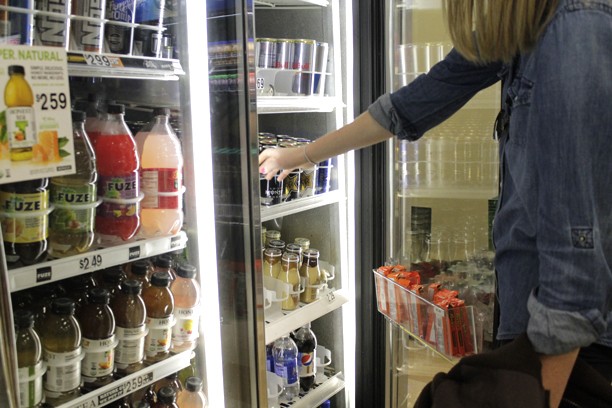Despite a national increase in emergency room visits due to energy drinks, the UA isn’t too concerned.
The nation has seen an increase from about 10,000 to 20,000 ER visits from the use of energy drinks in 2011, according to a report by the U.S. Substance Abuse & Mental Health Services Administration released last month. This is a 36 percent increase from the previous year.
However, the University of Arizona Medical Center had zero cases in 2012, and the University of Arizona Medical Center — South Campus only had one case in 2012, according to Keith Boesen, director of the Arizona Poison and Drug Information Center.
There were 11 cases in Arizona — excluding Maricopa County — where someone went to the hospital because of energy drinks in 2012, he added. However, it is not mandatory for hospitals to call the Arizona Poison and Drug Information Center unless they need assistance handling a particular case, so there might be more cases than reported, Boesen said.
On campus, beverage sales comprise roughly 30 percent of all student union and convenience stores’ sales. Energy drinks are the sixth most popular beverage item sold and account for 1.4 percent of beverage sales, according to Todd Millay, marketing manager of Arizona Student Unions.
“I would suspect it’s the ‘abuse’ of drinking these energy drinks by students in relation to alcohol consumption that would result in an ER visit,” Millay said in an e-mail.
However, Lynn Reyes, an alcohol and other drug prevention specialist for Campus Health Service, said that Campus Health doesn’t see people having a problem with energy drinks, especially not with alcohol.
“What I’m seeing more of is people not even using mixers as much as they used to,” Reyes said. “[They are] just drinking straight hard alcohol. I haven’t seen the same thing that people are seeing nationally. It doesn’t mean that it’s not happening, but people are just saying, ‘You know, we’re just drinking it straight because it saves money.’”
Campus Health saw an increase in ER visits from energy drinks a year or two ago because of the popularity of the drink Four Loko. Since then, there has not been an increase in visits regarding energy drinks, Reyes said.
“Some people were reporting that they were more impacted by the caffeine in it [Four Loko] so that they were feeling drunk but also feeling jittery and shaky because of the enormous amount of caffeine that they ingested, not knowing that they were getting that much,” Reyes said. “There is that kind of overstimulation thing that people get but also the amount of alcohol, for some people, did make them vomit and just get totally drunk.”
The U.S. Food and Drug Administration does not regulate the amount of caffeine or the nutrition label facts in energy drinks because they are listed as dietary supplements, so the amount of caffeine listed on energy drink cans may be incorrect.
Maggie Tomlinson, a clinical dietitian at the UAMC, said the FDA should regulate the amount of caffeine in energy drinks.
“They regulate it in soda, so I don’t see the difference between them,” Tomlinson said. “I know these energy drinks are a moneymaker. But when it comes down to health, I think that should be a [different] priority than making money, especially since they are targeted toward a younger population, such as students.”
Energy drink consumption may lead to increased blood pressure and heart rate, and other additives such as taurine and ginseng increase the two even more, Tomlinson said. Part of the problem is that people aren’t good at judging serving sizes, and since energy drinks aren’t required to have labels on products, some of them may be incorrect. Also, volume sizes have increased for energy drinks, according to Tomlinson.
“When Redbull first came out, it was a smaller size, and then they increased to a larger volume,” Tomlinson said. “And you don’t know how much is in a serving size. Are they saying how much is in all of it or half of it?”
Some students weren’t surprised that there has been an increase in ER visits nationwide due to energy drinks.
“If you drink one, it’s like drinking a coffee,” said Sarah Beal, mining engineering junior. “But if you binge drink them, yeah, you’re probably [going to the ER]. But that’s like with anything, if you abuse it.”
Molecular and cellular biology senior, Dominic Martel, agreed that energy drinks shouldn’t be used in excess. Because his background is in science, he said he pays attention to ingredient lists and rarely uses energy drinks.
“I’m sure there are two groups of people,” Martel said. “There are students who are like, ‘I need energy; I need to stay awake for a test,’ and so they only do it a couple of times, and then there are people who are habitual drinkers. I think it’s kind of like cigarettes, where we know that it is bad for us, but we still do it anyway.”
Overall, from a dietitian’s standpoint, using energy drinks is still not a good idea for students to get energy, despite the UA having no trouble with them, according to Tomlinson.
“If you want energy and you want to feel good,” Tomlinson said, “my best recommendation is eat good food, get enough sleep, take care of yourself; stay hydrated.”









